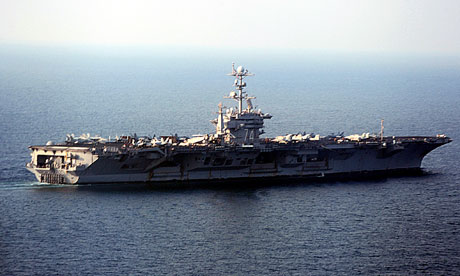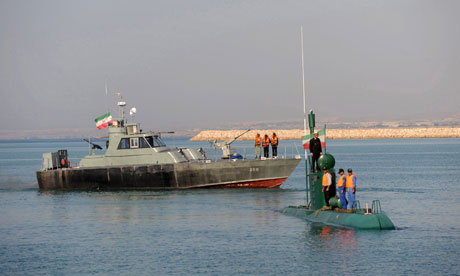BAK
JF-Expert Member
- Feb 11, 2007
- 124,790
- 288,005
Iran-US tensions over Gulf send oil prices soaring
Brent crude spot prices rise from $107 to $111 after Tehran threatens US aircraft carrier over use of crucial shipping route

US navy ship in the Sea of Oman, near the Strait of Hormuz. Iran warned a US aircraft carrier would risk attack by its new surface-to-sea missiles if it returned to the Gulf. Photograph: Reuters
The price of oil jumped by $4 a barrel on Tuesday as tension between Iran and the US fuelled fears of disruptions to supply.
Brent crude spot prices rose from $107 to $111 after Iran threatened to take action if the US navy moves an aircraft carrier into the Gulf.
US light crude, which dropped below $100 a barrel before Christmas, hit $102.23 a barrel – a rise of $3.40 on the day.
Analysts said the jump in prices was likely to continue as long as Tehran appeared ready to use force against US warships patrolling the strategically vital strait of Hormuz at the mouth of the Gulf.
Iran's army chief, General Ataollah Salehi, warned a US aircraft carrier not to return to the Gulf or risk attack by new surface-to-sea missiles tested by the military in recent days.
Tehran's latest tough rhetoric over the waterway is part of a feud with the US over new sanctions designed to discourage the Iranian state from developing nuclear weapons.
Salehi spoke as a 10-day Iranian naval exercise ended near the strait of Hormuz. Iranian officials have said the drill aimed to show that Iran could close the shipping route, as it has threatened to do if the US brings into force strong new sanctions over Iran's nuclear programme.
The strait, leading into the Gulf of Oman and Arabian Sea, is the only possible route for tankers transporting crude from the oil-rich states of the Gulf to western markets. A sixth of the world's oil exports passes through it every day.
John Kilduff, a partner at the hedge fund Again Capital in New York, said better-than-expected manufacturing output by US firms, which is likely to boost the demand for oil, was also a factor in the oil price rise.
"The supportive economic data and the geopolitical concerns are furthering the crude oil rally," he said.
"The temperature is going up every day now on the Iran situation – new sanctions, new missile launches and sabre-rattling are all contributing," he added.
Oil prices have been trending downwards since last May, when it became apparent the recovery in Europe and the US was running out of steam. The euro crisis, which re-ignited in July, pushed prices down further. Brent crude peaked at $126 last May before falling by a fifth to $100 in October.
Salehi's warning to the US aircraft carrier USS John C Stennis not to come back seemed as if it was designed to further declare the strait and the Gulf as being under Iranian control, though there is little way for Tehran to enforce the warning without military action. The strait is divided between Iran and Oman's territorial waters, and international law requires them to allow free passage through it.
"We recommend to the American warship that passed through the strait of Hormuz and went to Gulf of Oman not to return to the Persian Gulf," the general was quoted as saying by the state news agency, IRNA.
He said Iran's enemies had understood the message of the naval exercises, saying: "We have no plan to begin any irrational act but we are ready against any threat."
Brent crude spot prices rise from $107 to $111 after Tehran threatens US aircraft carrier over use of crucial shipping route
- Phillip Inman, economics correspondent
- guardian.co.uk, Tuesday 3 January 2012 20.23 GMT

US navy ship in the Sea of Oman, near the Strait of Hormuz. Iran warned a US aircraft carrier would risk attack by its new surface-to-sea missiles if it returned to the Gulf. Photograph: Reuters
The price of oil jumped by $4 a barrel on Tuesday as tension between Iran and the US fuelled fears of disruptions to supply.
Brent crude spot prices rose from $107 to $111 after Iran threatened to take action if the US navy moves an aircraft carrier into the Gulf.
US light crude, which dropped below $100 a barrel before Christmas, hit $102.23 a barrel – a rise of $3.40 on the day.
Analysts said the jump in prices was likely to continue as long as Tehran appeared ready to use force against US warships patrolling the strategically vital strait of Hormuz at the mouth of the Gulf.
Iran's army chief, General Ataollah Salehi, warned a US aircraft carrier not to return to the Gulf or risk attack by new surface-to-sea missiles tested by the military in recent days.
Tehran's latest tough rhetoric over the waterway is part of a feud with the US over new sanctions designed to discourage the Iranian state from developing nuclear weapons.
Salehi spoke as a 10-day Iranian naval exercise ended near the strait of Hormuz. Iranian officials have said the drill aimed to show that Iran could close the shipping route, as it has threatened to do if the US brings into force strong new sanctions over Iran's nuclear programme.
The strait, leading into the Gulf of Oman and Arabian Sea, is the only possible route for tankers transporting crude from the oil-rich states of the Gulf to western markets. A sixth of the world's oil exports passes through it every day.
John Kilduff, a partner at the hedge fund Again Capital in New York, said better-than-expected manufacturing output by US firms, which is likely to boost the demand for oil, was also a factor in the oil price rise.
"The supportive economic data and the geopolitical concerns are furthering the crude oil rally," he said.
"The temperature is going up every day now on the Iran situation – new sanctions, new missile launches and sabre-rattling are all contributing," he added.
Oil prices have been trending downwards since last May, when it became apparent the recovery in Europe and the US was running out of steam. The euro crisis, which re-ignited in July, pushed prices down further. Brent crude peaked at $126 last May before falling by a fifth to $100 in October.
Salehi's warning to the US aircraft carrier USS John C Stennis not to come back seemed as if it was designed to further declare the strait and the Gulf as being under Iranian control, though there is little way for Tehran to enforce the warning without military action. The strait is divided between Iran and Oman's territorial waters, and international law requires them to allow free passage through it.
"We recommend to the American warship that passed through the strait of Hormuz and went to Gulf of Oman not to return to the Persian Gulf," the general was quoted as saying by the state news agency, IRNA.
He said Iran's enemies had understood the message of the naval exercises, saying: "We have no plan to begin any irrational act but we are ready against any threat."
